-
When and how the Aluk water station was first interrupted
On 9 October 2019, only few hours after the launch of Turkey’ so called Operation Peace Spring,[1] the Aluk water pumping station (36.873075,40.185889) rendered inoperable due to artillery shelling; several shells rocked the station and others hit the the power lines supplying it, which resulted in a complete stop of water pumping to the city of al-Hasakah and its suburbs. That was confirmed in a report published in late January 2020, by the Independent International Commission of Inquiry on the Syrian Arab Republic, which said that water repair workers attempted to conduct repairs, but were allegedly abducted by armed group fighters from Ahrar al-Sharqiyah (Brigade 123) though later released.[2]
The Aluk water station, which has been repeatedly interrupted, serves drinkable water to around 800.000 people besides being the main source to fill the tanker trucks that carry water to the makeshift camps of al-Hawl, al-Areesha (or al-Sadd) and Washo Kani (or al-Twaina), which host tens of thousands of IDPs from different Syrian regions.[3]
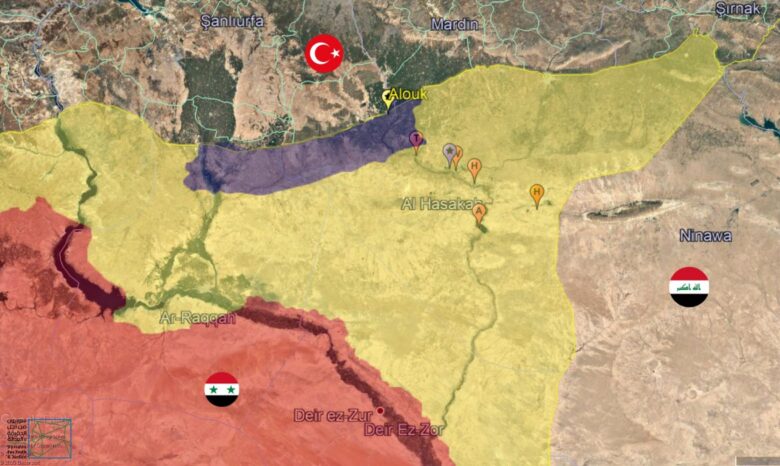
Image 1.
The Aluk station was established in 2010, for the purpose of collecting and pumping water, as a solution to the then water crisis in al-Hasakah and outskirts. In this context, 30 artesian wells were dug near the village of Aluk Sharqi, located 10 km. to the east of Ras al-Ayn/Serê Kaniyê, with a pump capacity of approximately 175.000 m³ of drinking water per day. The station has a 25.000 m³ water reservoir and 12 large pumps transport water through 67 km. long pipes to al-Himme area in northern rural al-Hasakah and from there to residential blocks.
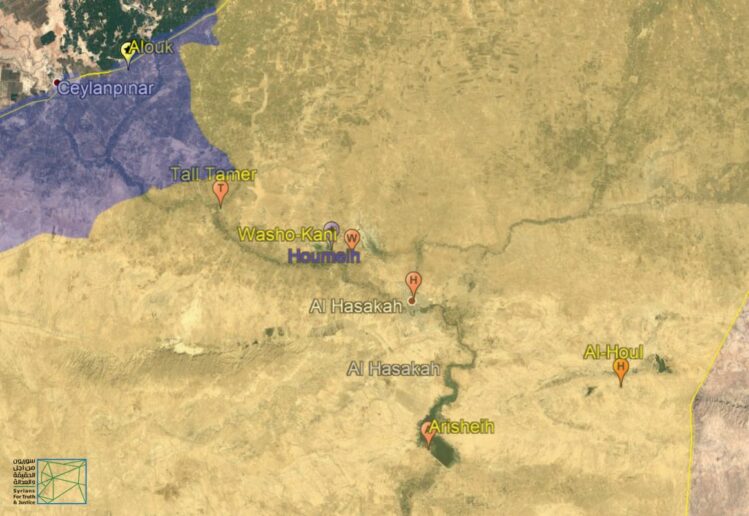
Images 1&2: maps of areas where the Aluk water station is the main source of water.
-
The first attempt to resume the Aluk water pumping station
The Autonomous Administration and the Syrian Government, who share control over the city of al-Hasakah, attempted to re-launch the Aluk water station, with direct assistance from the Russian military command in northeastern Syria, which has held talks with Turkey and intervened more than once to urge Turkish forces to operate the station. However, in exchange for resuming the water pump from the Aluk station, Turkey requested maintaining the Mabrouka power station – located under Turkey and allies’ control to the west of Ras al-Ayn/Serê Kaniyê – and supplying it with electricity from the Tishrin Dam, which is jointly controlled by the Syrian government and Autonomous Administration; means supplying Ras al-Ayn and Tell Abiad with power in exchange for providing al-Hasakah and outskirts with water from the Aluk station.
The Mabrouka power station located on the M4 international highway,[4] 14km. away from the town of Mabrouka. The station is supplied by Tishrin Dam and in turn provides power to the province of al-Hasakah and other areas in al-Jazira region, northeast Syria. However, during the Turkish offensive in last October, the Mabrouka power station was rendered inoperable after its supplement was suspended by the Syrian Democratic Forces (SDF) of the Autonomous Administration and many of its equipment, including generators, were stolen by fighters of the Syrian opposition armed groups (the station was mainly controlled by Al Safwa Al Islamiya Battalions, also known as al-Safwa Division).[5]
-
The first/fundamental agreement: Aluk water for Tishrin power
After talks with Russia, Turkey allowed a group of workers with delegates from the Syrian State Electricity Corporation in al-Hasakah, and the Syrian Arab Red Crescent, to enter the Aluk water station for the first time after Operation Peace Spring, on 9 November , 2019, in order to check it and to study how to rehabilitate it.
Under preliminary understandings, the Aluk water station was resumed on 13 November, 2019, (after 35 days of suspension and four days of maintenance), being supplied with power from Al Swaydiah power station in Ad Darbasiyah, not the Mabrouka station, which was still turned off.
The Russian-Turkish talks led to a final agreement, in early December 2019, stipulating the withdrawal of the Syrian opposition forces from the Mabrouka power station and handing it over to the Syrian government forces and the Autonomous Administration, provided that the latter would maintain it and supply the Operation Peace Spring areas with 7 MW of electricity from the Tishrin Dam, in return for Ankara’s permission to pump water from the Aluk station. This was the first basic agreement between the two countries.
-
Russian official discontent as Ankara disavows the first agreement
On 24 February 2020, the Turkish forces turned off the Aluk water station and expelled workers from it without explaining the reasons. Ten days later, on 4 March 2020, the Russian military command held a press conference at the Russian base in the Qamishli/Qamishlo International Airport, through which it accused Turkey of impeding the relaunch of the Aluk station and of non-commitment to the agreement signed with it.[6]
General Anatoly, the commander of the Russian military forces in northeastern Syria, said that he discussed with Burhan Aktaş, head of the Turkish Coordination Center, by phone, the relaunch of the Aluk station. Later, on 26 February 2020 the two met physically in the Turkish city of Nusaybin to discuss this same subject.
Anatoly confirmed that the Turkish side did not adhere to the plans they put together, despite the assistance given by Russia to SDF and the Syrian government in maintaining the Mabrouka station and supplying it with electricity from the Tishrin Dam. He added that the Autonomous Administration cut off the power to the Mabrouka station in response to Turkey’s turning off the Aluk water station.
-
Allegations by Ras al-Ayn/Serê Kaniyê’s local council to justify Turkey’s disavowal of the agreement
Following the Russian accusation against Ankara, the local council of the city of Ras al-Ayn/Serê Kaniyê (affiliated with the Syrian opposition), posted an update on its official Facebook page on 4 March 2020, saying that turning off the Aluk water station was a response to the interruption of power from the Tishrin Dam, to the cities of Ras al-Ayn/Serê Kaniyê and Tell Abiad, and accusing the Autonomous Administration and the Syrian government of cutting the power to the Mabrouka station.
According to the Facebook post by Ras al-Ayn/Serê Kaniyê’s local council – which was formed after Turkey and allied National Army took over the city – the power supplement of the Aluk water station is from the Tishrin Dam, and thus re-pumping water requires resuming the power supply to the city of Ras al-Ayn/Serê Kaniyê.
However, what the local council said was proven false, as investigations revealed that it is possible to supply the Aluk water station from al-Swaydia generating station, in rural Al-Malikiyah/Derik city in the event of a power outage from the Ad Darbasiyah station or from the Tishrin Dam.
Human Rights Watch (HRW) issued a report on 31 March 2020, in which it confirmed that the Mabrouka power station does not supply the Aluk pumping station and that it has alternative power sources enough to operate it.[7]
-
The second agreement: Bargaining for an additional load of electricity
On 5 March 2020, one day after the Russian announcement, the Aluk water station was put in service again after being interrupted for 11 days and its workers expelled. After consent from Turkey, the station resumed pumping water to the city of al-Hasakah and the town of Tall Tamr and their suburbs.
On this, engineers in the team of electricians, jointly formed by the Autonomous Administration and the Syrian government spoke to STJ saying that Turkey allowed the resume of the Aluk station after discussions and understandings concluded with the Russian side, stipulated to raise the power capacity from 7 MW to 10 MW in order to supply Ras al-Ayn/Serê Kaniyê, Tell Abiad and their suburbs (Operation Peace Spring areas) with electricity.
-
Turkey renounced the second agreement and asked for 23 MW of electricity from Tishrin Dam at the expense of other areas in Syria’s north east
On 21 March 2020, Turkish forces interrupted the Aluk water station again without disclosing reasons.
On this, an engineer supervising the team of electricians, jointly formed by the Autonomous Administration and the Syrian government confirmed to STJ that Turkey stipulated to raise the power capacity from 10 MW to 23 MW in its areas, in exchange for resuming the Aluk water station, though knowing that that would be at the expense of the Autonomous Administration areas.
Note that the city of Ras al-Ayn/Serê Kaniyê was supplied with 10 MW of power before the Turkish offensive, according to the Power Authority of the Autonomous Administration.
-
Domestic and international condemnation of Turkey’s weaponizing water in COVID-19 pandemic
In a statement issued on 23 March 2020, the United Nations Children’s Fund (UNICEF) condemned the water cutoff saying through its representative in Syria, Fran Equiza: “interruption to key water station in the northeast of Syria puts 460,000 people at risk as efforts ramp up to prevent the spread of Coronavirus disease…The interruption of water supply during the current efforts to curb the spread of the Coronavirus disease puts children and families at unacceptable risk. Handwashing with soap is critical in the fight against COVID-19.”[8]
In turn, 49 Syrian organizations released a statement denouncing the repeated water cut and calling for the neutralization of the Alok water station from political and military conflicts and ensuring that all residents of northeastern Syria benefited fairly from it without discrimination of any kind.[9]
In the same context, Human Rights Watch (HRW) also issued a report on 31 March 2020 saying: “Turkish authorities’ failure to ensure adequate water supplies to Kurdish-held areas in Northeast Syria is compromising humanitarian agencies’ ability to prepare and protect vulnerable communities in the COVID-19 pandemic.”[10]
-
The third agreement: resuming Aluk water for additional power load
Several rounds of negotiations between the Russian military command in northeast Syria and the Turkish forces led to an agreement provided for turning on the Aluk water pumping station on 26 March 2020; five days after the last interruption.
The Russian and Turkish sides, agreed to supply the Operation Peace Spring areas with 12 MW of electricity from the Tishrin Dam via the Mabrouka power station, in exchange for pumping water from the Aluk station to the city of al-Hasakah and its suburbs, according to engineers in the team of electricians, jointly formed by the Autonomous Administration and the Syrian government.
Disregarding the agreement, Turkey interrupted the water again to the city of al-Hasakah and its countryside on 29 March 2020, for the second time in less than 10 days, but it was resumed, however, after only one day, specifically on 30 March 2020, albeit without ensuring permanence.
-
Turkish-backed armed groups shell the main water pipeline, interrupting the pumping again
Again, on 2 April 2020, the water was cut to al-Hasakah and its surroundings due to a damage in the main water pipeline – connecting the Aluk water pumping station and Al-Himme water collection station, western al-Hasakah, near the village of Umm al-Keif (3km to the north of Tell Tamer) – caused by artillery shelling by the Syrian opposition’s National Army and Turkish forces, in control of the Operation Peace Spring areas.
On 3 April, the maintenance team, formed jointly by the Syrian government and the Autonomous Administration, entered the Aluk station to repair the damaged pipeline.
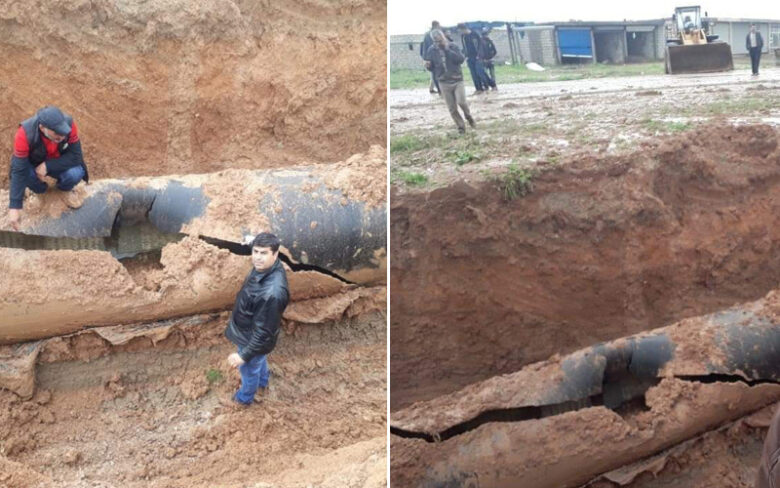
Image 3- The Aluk pumping station’s main water pipeline, which was put out of service by Turkey and its allies’ bombardment with mortars and artillery. Credit: “al-Hasakah” Facebook page.
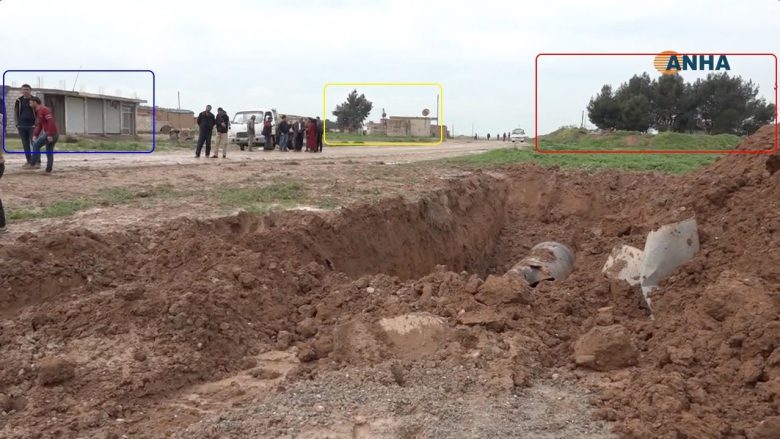
Image 4.
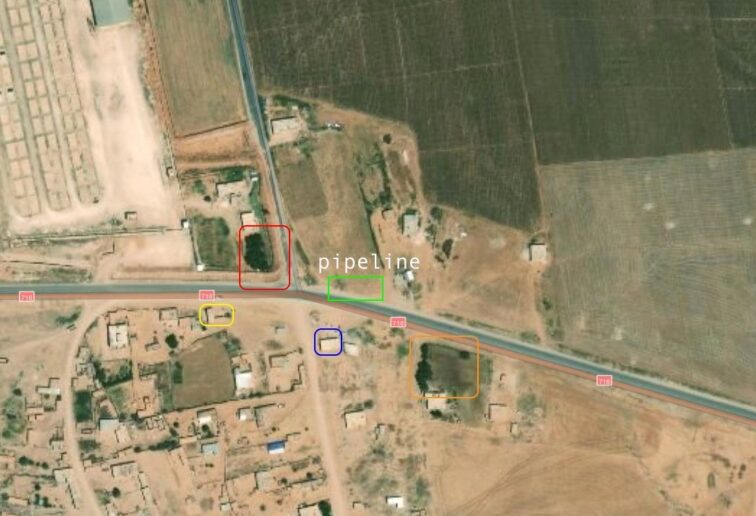
Image 5. Images 3, 4 and 5 show the damage caused to the main water pipeline and the available visual analysis. The images are screenshots taken from a video published by Hawar News Agency.
The Aluk water station was resumed on 5 April 2020, soon after the pipeline was fixed.
-
Sporadic water cut
Yet again the Aluk water station was interrupted on 7 May 2020, to be resumed again after a couple of days; on 9 May 2020. This was followed by another five-day water outage; between 5 and 10 July 2020. Each time the water was cut off, the two parties – the Syrian opposition and the Autonomous Administration – accused each other of being responsible for that.
-
Another interruption of the Aluk station following poor water pumping
On 13 August 2020, Turkish forces turned off the Alok water pumping station, under their control, to hundreds of thousands of people in northeastern Syria, just as they did earlier repeatedly in March, April and July and that was also followed by a frequent lack of water pumping.
This interruption was the eighth since Turkey and Turkish-backed forces took control of the Aluk water station. Sporadic water shortages disrupt daily life of the population on top of the lockdown imposed since 5 August 2020, to contain the spread of Covid-19.
Turkey’s turning off the Aluk water station followed the Autonomous Administration’s cut of power to Operation Peace Spring areas on 13 August 2020, which was a response to Ankara’s non-compliance with the Russia-mediated water-for-electricity agreement.
-
What are the reasons for the poor water pumping from the Aluk station?
According to the engineers supervising the Aluk water station, the water yield from the station has gradually decreased to nearly a quarter since the beginning of May 2020, for several reasons, including:
- Only two of the twelve pumps were operated at the Aluk station, because the voltage coming to it was not enough to operate it at full capacity, due to the illegal extraction of electricity from the power grid supplying the station. Therefore, the water pumped did not exceed a maximum of 25,000 m3 per day.
On this regard, power maintenance workers at the station and locals told STJ that armed groups of the National Army based in eastern rural Ras al-Ayn/Serê Kaniyê, among them the Sultan Murad Division and the Northern Hawks Brigade, were responsible for the poor voltage coming to the Aluk station, as they have been stealing electricity from the Ad Darbasiyah station which is intended to supply the water station.
- The illegal drawing of water from the Aluk water station to use it in watering orchards – along the water transmission line to the Al-Himme water collection station, western al-Hasakah – decreased the quantity of water pumped to the city of al-Hasakah and its suburbs.
Locals confirmed to STJ that fighters of the National Army’s armed groups made holes in the water transmission line, extended from the Aluk station, to water hundreds of hectares of cotton fields, which they or their agents cultivated after seizing.
-
The thirst suffocates al-Hasakah
The plight of locals seriously worsened during the water cutoff. Thus, civilians and activists from al-Hasakah created the hashtag #The thirst suffocates al-Hasakah, to pressure Turkey and allied armed groups to turn on water to the city. Meanwhile, religious, popular and social communities have shown their solidarity with civilians, and called for neutralizing water from conflicts and to assign the Aluk station’s administration to an independent specialized civilian team, under international supervision and surveillance. In turn the International Committee of the Red Cross (ICRC) expressed its concern about the scarcity of drinking water in the city of al-Hasakah after shutting down the Aluk water station amid high temperatures, which exceeded 40°, according to a report published by Asharq Al-Awsat newspaper on 23 August 2020.
-
A new water station alternative to Aluk but with less capacity
In finding a sustainable solution, the Water Directorate of the Autonomous Administration in the city of al-Hasakah announced on 24 March 2020, its start to establish a new water pumping station with 50 wells in al-Himme area, western al-Hasakah, to operate as an alternative to the Aluk water station, eastern Ras al-Ayn/Serê Kaniyê. This project was scheduled to be completed within a month but its implementation was delayed until August 2020.[11]
On 21 August 2020, nearly five months after the project was launched, the Water Directorate of the Autonomous Administration in al-Hasakah stated that 25 wells in the Al-Himme station were operating partially in a testing phase and that it would supply drinkable water to a part of the city’s neighborhoods in three days.
The Water Directorate of the Autonomous Administration added that the new water station in Al-Himme would cover only 50% of al-Hasakah’s need of drinking water after Turkey interrupted the Aluk water pumping station in Ras al-Ayn/Serê Kaniyê.
However, local activists refuted what stated by the Autonomous Administration saying that the capacity of the new water station of Al-Himme is lesser than that of Aluk and that it barely would cover 25% of the water needs of the population of al-Hasakah and its suburbs, which estimated in 100.000 m3 per day, besides, its water quality is lesser than that pumped from the Aluk station.
-
A fourth agreement on resuming the Aluk water station
Under domestic and international pressure, Turkey and Russia – represented the Syrian government and the Autonomous Administration – reached a successful agreement, under which the Aluk water station was re-launched after ten days of interruption, and electricity came back to Operation Peace Spring areas.
The fourth agreement between the Turkish and Russian sides stipulated the entry of maintenance workers to the Aluk water station to operate seven water pumps, while only two were operated, in return for supplying Operation Peace Spring areas with 12 to15 MW of electricity from the Tishrin Dam, as stated to STJ exclusively by an engineer in the team of electricians, jointly formed by the Autonomous Administration and the Syrian government
Five days after operating the station, specifically on 27 August 2020, the supervisor engineer told STJ that the number of wells operated in the station reached 15 and that pumping water to Al-Himme water collection station is continued via 3 to 4 pumps. He also confirmed that the rest wells and the power network are continue to be fixed in order to increase the station water yield.
On 24 August 2020, 89 Syrian Organizations issued a press release denouncing the repeated cuts of Aluk water and calling on several international parties to:[12]
-
Pressure Turkey and affiliated local councils to resume the Alok water station urgently and immediately, and ensure that there would be no repetition of such cuts under any pretext.
-
Neutralize the Alok water station from political and military conflicts by suspending Turkey and other parties from using it to blackmail, and to hire a specialized and independent management team to run it under international supervision and control.
-
Ensure that all population in Syria’s north east benefit from water and other natural resources fairly and equitably without discrimination of any kind, under impartial international supervision.
-
Investigate into the repeated water cuts transparently and independently, and thus hold those involved accountable whoever they were.
[1] On October 9, 2019, Turkish president Rajab Tayyip Erdogan announced the launch of “Operation Peace Spring” into northern Syria by Turkish forces and allied rebel groups in the National Army of the Syrian Interim Government, operating under the National Coalition for Syrian Revolutionary and Opposition Forces. Just a day before the start of the operation, the National Coalition for Syrian Revolutionary and Opposition Forces released a statement supporting the Turkish announcement of a looming military operation in the region. The statement said “The Coalition supports the efforts of the National Army, the Ministry of Defense and those of the Joint Chiefs of Staff. We confirm the readiness of our National Army to combat terrorism in cooperation and joint action with brothers in Turkey.”
[2] “Report of the Independent International Commission of Inquiry on the Syrian Arab Republic”, 28 January 2020, https://undocs.org/en/A/HRC/43/57 (last visit: 26 August 2020).
[3] “North East Syria: Millions dealing with sporadic water shortages, crippled health services”, ICRC, 21 May 2020, https://www.icrcnewsroom.org/story/en/1913/north-east-syria-millions-dealing-with-sporadic-water-shortages-crippled-health-services (last visit: 26 August 2020).
[4] GPS coordinates of the Mabrouka power station (36°33’29.8″N 39°53’23.9″E).
[5]Al Safwa Al Islamiya Battalions formed in April 2016 by the integration of radical Islamist groups operating in Aleppo, namely; the Minhaj Al-Sunnah Battalions, Rijal Allah Battalion, Mecca Battalion, Al-Quwa Al-Muwahada Battalion, Yusuf Al-Halabi Battalion, Al-Ansari battalion, Omar Bin Abdulaziz Battalion, the Engineering Battalion and Saif Allah Battalion.
[6] “A Russian general reveals details of negotiations with the Turks to resume pumping water to al-Hasakah and Tall Tamr”, Kurdistan 24, March 2, 2020. (Last visit: March 31, 2020). https://www.kurdistan24.net/ar/news/3c5df9d5-e063-4b05-b011-43b44af56666
[7] “Turkey/Syria: Weaponizing Water in Global Pandemic?”, HRW, March 31, 2020,) https://www.hrw.org/news/2020/03/31/turkey/syria-weaponizing-water-global-pandemic (last visit: 26 August, 2020).
[8] “Interruption to key water station in the northeast of Syria puts 460,000 people at risk as efforts ramp up to prevent the spread of Coronavirus disease”, UNICEF, 23 March 2020, https://www.unicef.org/mena/press-releases/interruption-key-water-station-northeast-syria-puts-460000-people-risk-coronavirus (lase visit: 26 August 2020).
[9] “89 Organizations Denounce Turkey’s Repeated Water cut to Hundreds of Thousands of People in Syria’s North East”, STJ, 27 March 2020, https://stj-sy.org/en/89-organizations-denounce-turkeys-repeated-water-cut-to-hundreds-of-thousands-of-people-in-syrias-north-east/ (last visit: 26 August 2020).
[10] “Turkey/Syria: Weaponizing Water in Global Pandemic?”, HRW, 31 March 2020, https://www.hrw.org/news/2020/03/31/turkey/syria-weaponizing-water-global-pandemic (last visit: 26 August 2020).
[11] “The Water Directorate to implement a project as an alternative to Alok station in al-Hasakah”, Hawar News Agency, 24 March 2020, https://hawarnews.com/ar/haber/mdyryh-almyah-tbda-bmshrwa-bdyl-lmhth-alwk-fy-alhskh-h32047.htmlمديرية , (last visit: 26 August 2020).
[12] “89 Organizations Denounce Turkey’s Repeated Water cut to Hundreds of Thousands of People in Syria’s North East”, STJ, 24 August 2020, https://stj-sy.org/en/89-organizations-denounce-turkeys-repeated-water-cut-to-hundreds-of-thousands-of-people-in-syrias-north-east/ (last visit: 26 August 2020).

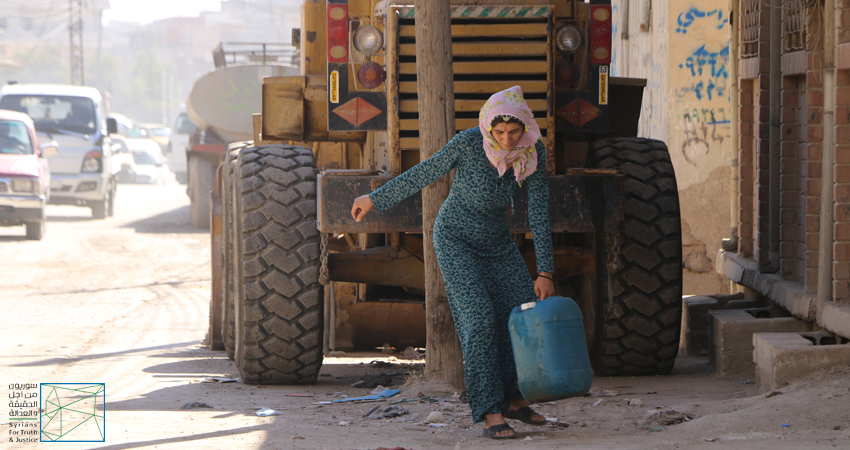
8 comments
[…] armed groups shut down access to pipeline water dozens of times over a period of six months, cutting off access to clean water for hundreds of thousands of people on each occasion. According to recently released figures from the U.N., the price of an average Syrian […]
[…] armed groups shut down access to pipeline water dozens of times over a period of six months, cutting off access to clean water for hundreds of thousands of people on each occasion. According to recently released figures from the U.N., the price of an average Syrian […]
[…] armed groups shut down access to pipeline water dozens of times over a period of six months, cutting off access to clean water for hundreds of thousands of people on each occasion. According to recently released figures from the U.N., the price of an average Syrian […]
[…] armed groups shut down access to pipeline water dozens of times over a period of six months, cutting off access to clean water for hundreds of thousands of people on each occasion. According to recently released figures from the U.N., the price of an average Syrian family’s […]
[…] armed groups shut down access to pipeline water dozens of times over a period of six months, cutting off access to clean water for hundreds of thousands of people on each occasion. According to recently released figures from the U.N., the price of an average Syrian […]
[…] armed groups shut down access to pipeline water dozens of times over a period of six months, cutting off access to clean water for hundreds of thousands of people on each occasion. According to recently released figures from the U.N., the price of an average Syrian […]
[…] armed groups shut down access to pipeline water dozens of times over a period of six months, cutting off access to clean water for hundreds of thousands of people on each occasion. According to recently released figures from the U.N., the price of an average Syrian […]
[…] armed groups shut down access to pipeline water dozens of times over a period of six months, cutting off access to clean water for hundreds of thousands of people on each occasion. According to recently released figures from the U.N., the price of an average Syrian family’s […]